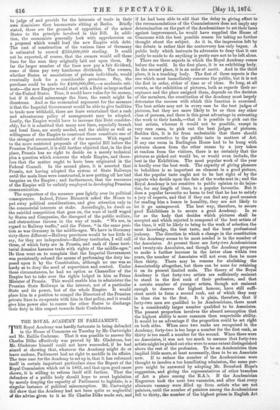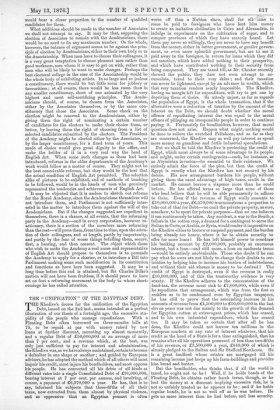to judge of and provide for the interests of trade
in their if he had been able to add that the delay in giving effect to own dominions than bureaucrats sitting at Berlin. Briefly the recommendations of the Commissioners does not imply any stated, these are the grounds of opposition of the minor determination on the part of the Academicians to set their faces States to the principle involved in this Bill. In addi- against improvement, he would have supplied the House of lion, the economists generally look with apprehension on Commons with the best possible reason for taking no further a proposal which would load the new Empire with debt. thought about the subject. As it is, the impression left by The cost of construction of the various lines of Germany the debate is rather that the controversy has only begun. A
is estimated to exceed £350,000,000 sterling. It could public body which instructs its advocates to deny that it can not be expected, of course, that the owners would sell these justly be made to do anything is pretty sure not to be left alone. lines for the sum they originally laid out upon them. By There are three aspects in which the Royal Academy comes far the larger number of the lines now pay a fair dividend, before the world. In the first place, it is an exhibiting body. some of them pay very handsome dividends. The owners, In the second place, it is an order of merit. And in the third whether States or associations of private individuals, would place, it is a teaching body. The first of these aspects is the eventually look for a considerable premium. Say, the one which most immediately concerns the public, but it i8 not purchase could be made for £400,000,000,—a moderate esti- the first in order, either of time or of ideas. So long, at all mate—the new Empire would start with a Debt as large as that events, as the exhibition of pictures, both as regards their ac- of the United States. True, it would have value for its money, ceptance and the place assigned them, depends on the decision but if it should mismanage the lines, the result might be of the members, the constitution of the Academy must largely disastrous. And as the economical argument for the measure determine the success with which this function is exercised. is that the Imperial Government would be able to give facilities The best artists may not in every case be the best judges of to trade now withheld, there are fears entertained that a rash pictures, but they are more likely to be so than any other and adventurous policy of management may be adopted. class of persons, and there is this great advantage in entrusting Lastly, the Empire would have to increase this Debt consider- the work to their hands,—that it is possible to pick out the ably, for it is admitted that many new lines, especially branch best artists, whereas it would not be possible, except in and local lines, are sorely needed, and the ability as well as very rare cases, to pick out the best judges of pictures. willingness of the Empire to construct these constitute one of Besides this, it is far from undesirable that there should the strongest recommendations of the measure. With regard be some corrective to the public taste in matters of Art. to the more restricted proposals of the special Bill before the If any one room in Burlington House had to be hung with Prussian Parliament, it is still further objected that, in the first pictures chosen from the other rooms by a jury taken place, Prussia has no right to decide on a merely technical at random from the visitors, there is no certainty that the The present proportion involves the absurd assumption that the highest ability is more common than respectable ability. THE ROYAL ACADEMY IN PARLIAMENT. It would be an advantage if the proportion could be set right would bear a closer proportion to the number of qualified candidates for them.
What additions should be made to the number of Associates we shall not attempt to say. It may be that, supposing the election of Associates to remain with the Academicians, there would be no need to fix any maximum number. On the whole, however, the balance of argument seems to be against the prin- ciple of election by Academicians, either to their own body or to the Associateship. When men have to choose their colleagues, it is a very great temptation to choose pleasant men rather than good workmen men whom it is easy to get on with, rather than men who will:be likely to want to make changes. Perhaps the best electoral college in the case of the Associateship would be the whole body of exhibiting artists. In so large and so jealous a constituency, there would be but little room for jobbery or favouritism ; at all events, there would be less room than in any smaller constituency, short of one animated by the very highest and most self-sacrificing principles. The Acade- micians should, of course, be chosen from the Associates, either by the Associates themselves, or by the same con- stituency that chose the Associates. Some check on the election might be reserved to the Academicians, either by giving them the right of nominating a certain number of candidates for the electors to make their choice from, or better, by leaving them the right of choosing from a list of selected candidates submitted by the electors. The President of the Academy might be elected either by the Associates or by the larger constituency, for a fixed term of years. This mode of choice would give great dignity to the office, and make the holder of it in a very real way the head of English Art. When some such changes as these had been introduced, reforms in the older departments of the Academy's work would follow as a matter of course. They might not be the best conceivable reforms, but they would be the best that the actual condition of English Art permitted. The selection alike of pictures to be exhibited, and of methods of teaching to be followed, would be in the hands of men who genuinely represented the tendencies and achievements of English Art. It may be objected that it is useless to sketch out reforms for the Royal Academy, since the Academicians themselves will not introduce them, and Parliament is not sufficiently inter- ested in the matter to introduce them against the will of the Academicians. But if the changes suggested are expedient in themselves, there is a chance, at all events, that the reforming party in the Academy—and in every corporation, however re- actionary, there is a section of the members more reforming • than the rest—will press them, from time to time, upon the atten- tion of their colleagues, and at length, partly by importunity, and partly by the fear of worse things befalling them, secure, first, a hearing, and then consent. The object which those who wish to make the Academy a real nurse and representative of English Art should propose to themselves is to persuade the Academy to apply for a charter, or to introduce a Bill into Parliament making some such modification in its constitution and functions as have here been suggested. It may be a long time before this end is attained, but Sir Charles Dilke's motion will not have been fruitless, if it should prove to have set on foot a reforming movement in the body to whose short- comings he has called attention,



































 Previous page
Previous page